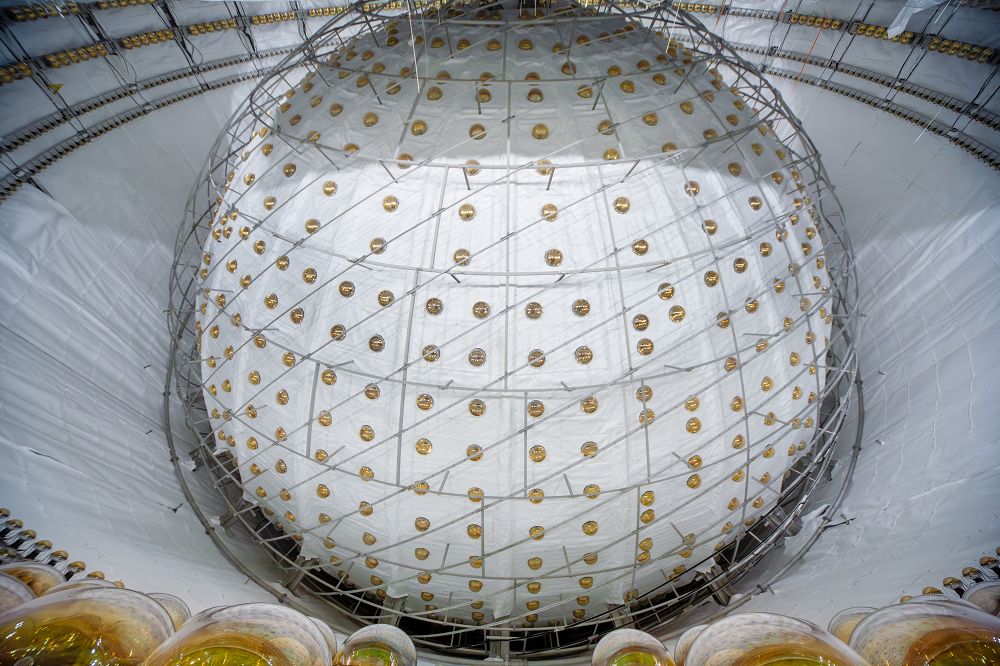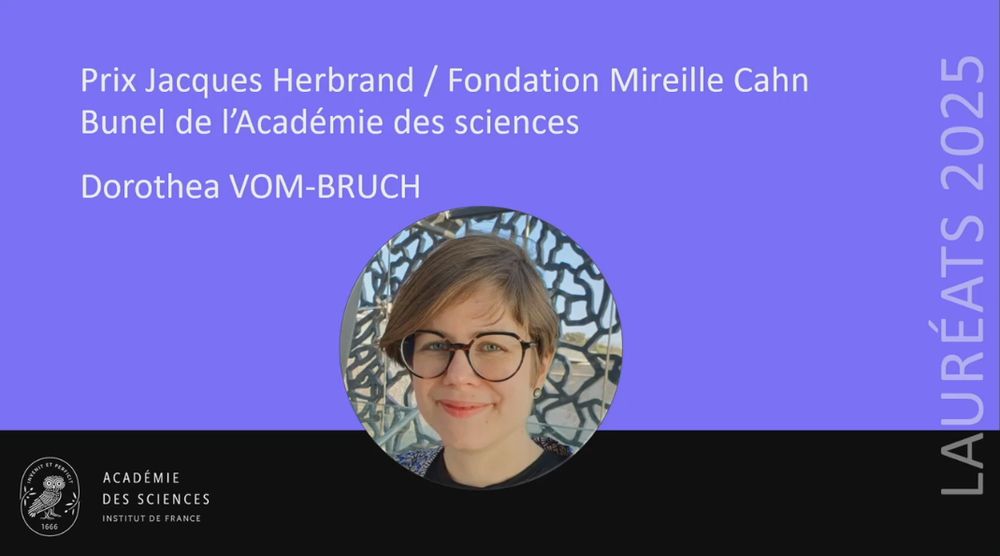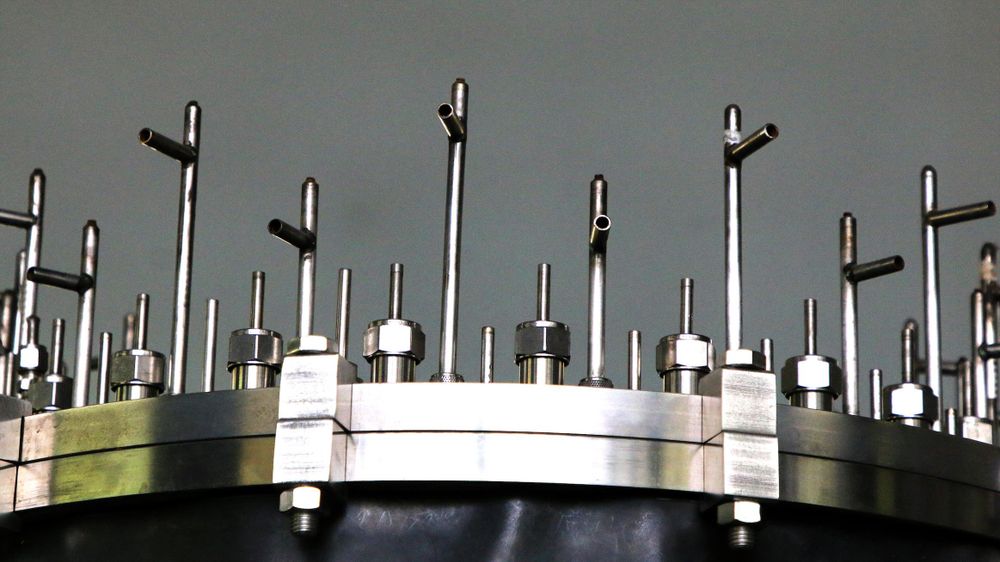@iphc-strasbourg.bsky.social @cnrs-alsace.bsky.social @cnrs-dr12.bsky.social @cnrsaquitaine.bsky.social @cnrs-bretagneloire.bsky.social @cnrs-idf-villejuif.bsky.social
28.11.2025 15:21 — 👍 0 🔁 0 💬 0 📌 0

JUNO, un détecteur géant de neutrinos - YouTube
▶️ [Playlist] | De la conception aux premiers résultats de physique des neutrinos : plongez dans l’aventure du projet #JUNO et découvrez les scientifiques des laboratoires français avec notre playlist YouTube. @cnrs.fr
youtube.com/playlist?lis...
28.11.2025 15:21 — 👍 3 🔁 1 💬 1 📌 0
L’installation de télescopes de grande taille aux Canaries pousse des astronomes à jouer les alpinistes. Leur objectif : étudier des objets et des événements très lointains tels que les sursauts gamma et les noyaux actifs de galaxies.
Un reportage CNRS le Journal, en partenariat avec Le Monde.
👩
La danse des télescopes et des rayons gamma I Reportage CNRS
#Reportage 🔭 Aux Canaries, les astronomes se muent en véritables grimpeurs 🧗
Suivez l’installation des télescopes géants de @ctao_universe pour étudier les sursauts gamma et les noyaux actifs de galaxies avec 4 scientifiques du #LAPP à Annecy @cnrs.fr
28.11.2025 14:59 — 👍 5 🔁 0 💬 0 📌 0

Le détecteur JUNO vu depuis l'extérieur
#ActualitéScientifique 💡
Seulement deux mois après son démarrage, l'expérience JUNO livre ses premiers résultats. Le jeune détecteur de neutrinos a mesuré avec une précision inégalée deux paramètres de l'oscillation de ces particules insaisissables 👇
in2p3.cnrs.fr/fr/cnrsinfo/...
20.11.2025 15:28 — 👍 31 🔁 6 💬 0 📌 1
Every year, CERN offers various professional development programmes for teachers. Last month, it was the turn of French teachers, who came to CERN to keep up-to-date with the latest developments in particle physics, and experience a dynamic research environment.
18.11.2025 08:12 — 👍 364 🔁 64 💬 11 📌 3

Carte des expériences scientifiques sur la matière noire.
🔍 À l’occasion du #DarkMatterDay, découvrez la carte interactive mondiale des expériences qui traquent la matière noire.
De nombreux projets qui contribuent à percer l’un des + grands mystères de l’Univers
👉 www.symmetrymagazine.org/dark-matter-...
@symmetrymagazine.org @cnrsalpes.bsky.social
03.11.2025 11:53 — 👍 0 🔁 0 💬 0 📌 0

Dark Matter Day (Journée de la matière noire)
Le 31 octobre, le monde entier fête la chasse à la matière la plus insaisissable avec une série d'événements Dark Matter Day
🔭 Envie de tout savoir sur la matière noire ? #DarkMatterDay
Explications, images, expériences : notre playlist YouTube vous emmène au cœur de l’Univers invisible 🌌
@cnrs.fr @cnrs-insu.bsky.social @symmetrymagazine.org
▶️
31.10.2025 10:30 — 👍 2 🔁 1 💬 1 📌 0

Page d'accueil du site web. il est écrit "qu'est-ce que la matière noire" ?
🧐 À l’occasion du #DarkMatterDay, plongez dans l’Univers de la matière noire
avec lamatierenoire.in2p3.fr
Découvrez les expériences et les scientifiques qui traquent cette mystérieuse matière !
@cnrs.fr @symmetrymagazine.org
31.10.2025 10:30 — 👍 2 🔁 1 💬 1 📌 0

Logo Dark Matter Day - tout le monde aime les mystères
🌌 31 octobre, on célèbre le #DarkMatterDay !
Une journée pour plonger dans les mystères de la matière noire, cette matière invisible qui compose près de 27 % de l’Univers.
🔗 En savoir plus : www.interactions.org...
@cnrs.fr @symmetrymagazine.org
31.10.2025 10:30 — 👍 7 🔁 3 💬 1 📌 0

✨ 👩🔬 Toutes nos félicitations à @sophiecarenco.bsky.social du CINAM et Dorothea vom Bruch du CPPM qui sont lauréates des prix 2025 de @academiesciences.bsky.social !
@univ-amu.fr @cnrs.fr @cnrs-in2p3.bsky.social
www.provence-corse.cnrs.fr/fr/cnrsinfo/...
28.10.2025 18:13 — 👍 11 🔁 4 💬 0 📌 0
@cnrs.fr @cnrs-dr12.bsky.social @cnrs-idf-villejuif.bsky.social @lhcb.bsky.social @lhcbpapers.bsky.social @cnrs-paris-saclay.bsky.social @cern.bsky.social
28.10.2025 16:28 — 👍 1 🔁 0 💬 0 📌 0

Dorothea VOM-BRUCH reçoit le Prix Jacques Herbrand / Fondation Mireille Cahn Bunel de l'Académie des sciences pour ses travaux sur les couplages de leptons chargés auprès de l'expérience LHCb, au CERN.

David Langlois reçoit le Prix Alfred Verdaguer / Fondation de l'Institut de France pour ses travaux sur la gravitation, la cosmologie et l’astrophysique des objets compacts relativistes.

Louis Fayard reçoit le Prix Jaffé / Fondation de l'Institut de France couronnant une carrière auprès des expériences du CERN, d'UA2 à NA48 puis ATLAS, où il a contribué à la découverte du boson de Higgs et à la mesure de ses propriétés.
🏅 Félicitations à Dorothea Vom Bruch (CPPM), Louis Fayard (IJCLab) et David Langlois (APC), lauréat·es des prix 2025 de l’@academiesciences.bsky.social !
👏 Trois distinctions pour leurs contributions majeures aux expériences du CERN et en cosmologie.
En savoir plus -> www.academie-science...
28.10.2025 16:27 — 👍 6 🔁 1 💬 1 📌 0
#ProfsAuCERN pour en savoir plus :
teacher-programmes.w...
@cern.bsky.social @cnrs.fr @udppc.bsky.social
19.10.2025 09:00 — 👍 0 🔁 0 💬 0 📌 0
#Éducation | Du 19 au 24 octobre, 20 professeur·es du secondaire sont accueilli·es au @cern.bsky.social pour un stage alliant cours, activités pédagogiques et visites d’installations, organisé par Sciences à l'École et @cnrs.fr Nucléaire & Particules
youtube.com/shorts/9...
@udppc.bsky.social
19.10.2025 09:00 — 👍 2 🔁 2 💬 1 📌 0

Division of Nuclear Physics Fellowship
The American Physical Society is a nonprofit membership organization working to advance physics by fostering a vibrant, inclusive, and global community dedicated to science and society.
🏅Congratulations to Navin Alahari, 2025 APS Fellow, for outstanding contributions to nuclear science and the development of innovative techniques to study rare isotopes. Navin is a @cnrs.fr nuclear physicist at GANIL 👏
www.aps.org/funding-reco... @apsphysics.bsky.social
13.10.2025 16:35 — 👍 4 🔁 1 💬 0 📌 0

Division of Nuclear Physics Fellowship
The American Physical Society is a nonprofit membership organization working to advance physics by fostering a vibrant, inclusive, and global community dedicated to science and society.
🏅 Félicitations à Navin Alahari, physicien nucléaire @cnrs.fr au GANIL, lauréat 2025 d'un Fellowship de l’@apsphysics.bsky.social, pour ses apports majeurs à la physique nucléaire et le développement de nouvelles techniques d’étude des isotopes rares. 👏
www.aps.org/funding-reco...
13.10.2025 14:48 — 👍 3 🔁 1 💬 0 📌 0
In case you missed it, here’s an overview of the 2025 European Physical Society Conference on High Energy Physics, which took place this summer in Marseille, France. #EPSHEP2025
@cnrs-in2p3.bsky.social @epshep2025.bsky.social
09.10.2025 09:14 — 👍 11 🔁 2 💬 2 📌 0
@symmetrymagazine.org
07.10.2025 08:08 — 👍 0 🔁 0 💬 0 📌 0
YouTube video by CNRS - En direct des labos
E=mc2, l'équation la plus célèbre d'Einstein | #nobelprize #physics
🥳 En ce jour de l’annonce du prix Nobel de #physique, nous célébrons le 120ᵉ anniversaire de l’équation E = mc², publiée en 1905 par Albert Einstein.
Découvrez ce qui se cache derrière cette simple équation qui a bouleversé la physique 🧐
#PrixNobel #NobelPrize @cnrs.fr
07.10.2025 07:54 — 👍 3 🔁 1 💬 1 📌 0

Antoine Petit, @cnrs.fr Chairman & CEO signed, with 4 Institutes of the University of Tokyo, the renewal of the CNRS-UTokyo agreement for ILANCE. This International Research Lab studies astrophysics, cosmology & neutrino, and plays a major role in the Hyper-Kamiokande project
@cnrs-in2p3.bsky.social
06.10.2025 03:25 — 👍 3 🔁 1 💬 0 📌 0

A collection of the winning photos
#Photowalk 📸 | Discover the 18 winning photos of the Global Physics Photowalk 2025 in France from 6 particle physics labs of @cnrs.fr
Congratulations to the winners 🎉
The international winners will be revealed in December! #PhysPics25
www.in2p3.cnrs.fr/en...
03.10.2025 11:15 — 👍 2 🔁 0 💬 0 📌 0

Réacteur d'implantation ionique par immersion plasma (antennes micro-ondes). © Jean-Claude Allard / LPSC / CNRS
3e prix : 📸 “ Sentinelles” par Jean-Claude Allard
Réacteur d'implantation ionique par immersion plasma (antennes micro-ondes)
Photo : © Jean-Claude Allard / LPSC / CNRS - www.allard-net.com/
#PhysPics25 #LPSC @cnrs.fr @cnrsalpes.bsky.social @ugrenoblealpes.bsky.social [4/4]
03.10.2025 10:47 — 👍 3 🔁 0 💬 0 📌 0

Source de plasmas tête-bêche (argon) © Morgane Coustrain / LPSC / CNRS
2e prix : 📸 “Protubérances solaires” par Morgane Coustrain @nashmerwolf
Source de plasmas tête-bêche (argon)
Photo : © Morgane Coustrain / LPSC / CNRS
#PhysPics25 #LPSC @cnrs.fr @cnrsalpes.bsky.social @ugrenoblealpes.bsky.social [3/4]
03.10.2025 10:47 — 👍 2 🔁 0 💬 1 📌 0

Boite à gants pour la synthèse des sels fondus. © Mikaël Passereau / LPSC / CNRS
1er prix : 📸 “Concerto à six mains pour sels fondus” par @MikaelPassereau
Boite à gants pour la synthèse des sels fondus
Photo © Mikaël Passereau / LPSC / CNRS
#PhysPics25 #LPSC @cnrs.fr @cnrsalpes.bsky.social @ugrenoblealpes.bsky.social [2/4]
03.10.2025 10:46 — 👍 2 🔁 0 💬 1 📌 0

Coulisses du photowalk au Laboratoire de Physique Subatomique & Cosmologie. © Florent Collovati / LPSC / CNRS
📸 Voici les 3 photos qui ont remporté le concours Global Physics #Photowalk 2025 organisé au Laboratoire de Physique Subatomique & Cosmologie de Grenoble
Félicitations aux lauréat·es !
Prochaine étape : le concours international🤞
#PhysPics25 @cnrs.fr @cnrsalpes.bsky.social [1/4] 👇
03.10.2025 10:46 — 👍 4 🔁 0 💬 1 📌 1

carte Interlock du banc de tests des modules du détecteur ITkPix pour l'expérience Atlas Photo : © Sylvie Chazal / LAPP / CNRS
📸 “Atelier mécanique” par Sylvie Chazal
La carte Interlock du banc de tests des modules du détecteur ITkPix pour @atlasexperiment, utilisée pour le contrôle qualité à la réception des modules.
Photo : © Sylvie Chazal / LAPP / CNRS
#PhysPics25 #LAPP @cnrs.fr @cnrsalpes.bsky.social [4/4]
03.10.2025 10:32 — 👍 3 🔁 0 💬 0 📌 0

Longeron du futur détecteur interne de traces de l'expérience Atlas © Bernard Revillet / LAPP / CNRS
📸 “Répétitions” par Bernard Revillet
Un longeron du futur détecteur interne de traces d'@atlasexperiment. Les carrés verts sont des modules de détection à pixels.
Photo : © Bernard Revillet / LAPP / CNRS
#PhysPics25 #LAPP @cnrs.fr @cnrsalpes.bsky.social [3/4]
03.10.2025 10:32 — 👍 2 🔁 0 💬 1 📌 0

système d'injection laser utilisé dans l'expérience Virgo pour mesurer l'intercalibration des sphères intégrantes des calibrateurs optiques. © Bernard Revillet / LAPP / CNRS
📸 “Banc optique” par Bernard Revillet
Cette photo montre le système d'injection laser utilisé dans l'expérience @ego_virgo pour mesurer l'intercalibration des sphères intégrantes des calibrateurs optiques.
Photo © Bernard Revillet/LAPP/CNRS
#PhysPics25 #LAPP @cnrs.fr @cnrsalpes.bsky.social [2/4]
03.10.2025 10:32 — 👍 2 🔁 0 💬 1 📌 0

Coulisses du photowalk au Laboratoire d’Annecy de Physique des Particules d’Annecy © Maud Coppel / LAPP / CNRS
📸 Voici les 3 photos qui ont remporté le concours Global Physics #Photowalk 2025 organisé au @LAPPCNRS d’Annecy.
Bravo aux lauréat·es !
Prochaine étape : le jury international🤞
#PhysPics25 #LAPP @cnrs.fr @cnrsalpes.bsky.social [1/4]
03.10.2025 10:32 — 👍 2 🔁 0 💬 1 📌 0
Art, Peace & Science
Trying to foster science as an art form through astronomy
https://www.emilleishida.com/
🗞 Relations presse @cnrs
🌎 Engagée pour la protection de l'environnement & la médiatisation de ces sujets
🔴 Passée par #RTLMatin, France 24 & TF1
Journaliste [Science / Innovation / Arménie]
French Centre for Scientific #Research @CNRS.fr Rep Office for #Japan #Korea #Taiwan | Scientific collaboration in all fields of knowledge | Based in #Tokyo
Maison d’édition spécialisée dans la diffusion du savoir et des connaissances en sciences humaines et en sciences.
https://www.cnrseditions.fr/
Média d’actualité scientifique en ligne 🗞️🎥
👉 Conçu chez @citedessciences.bsky.social et @palaisdecouverte.bsky.social
https://leblob.fr/
Encourager l’innovation, les échanges et l’interdisciplinarité en sciences pour et par les professeurs, valoriser les projets inspirants.
Science on Stage organise le festival national et sélectionne la délégation française pour le festival européen.
Faire découvrir la recherche au grand public dans un cadre détendu : le bar | ⚡#pint26 | festival de retour les 18-20 mai 2026 |
🗺️ @pintsWorld.bsky.social
Plus d'infos 👉 https://pintofscience.fr
Association de #débats scientifiques soutenue par le Centre National d'Etudes Spatiales (CNES) et la Société Française de Physique (SFP)
Lieu : café Sapiens, 38 rue Sibuet 75012 Paris (métro Picpus ou Bel-Air ou Nation). #science #sante #technique
S[cube] – Association de médiation scientifique depuis 2007
Exposition – Animation – Sensibilisation – Coordination partageonslessciences.com
Les actualités #sciences et #recherche du @CNRS
à #Paris
@CNRS_Paris sur Twitter
Le réseau national de la culture scientifique, technique et industrielle
Journaliste - Radio France - Epinal #Vosges #journalisme #media #servicepublic
Física de partículas y astropartículas, cosmología, y computación científica.
Dpto. de Investigación Básica del CIEMAT (Madrid, España).
phy6cool.ciemat.es
🏔️ Association Montagnes et Sciences
🎬 Festival de films d'aventure: Rencontres Montagnes & Sciences
🥾 Randonnées scientifiques
🤩 12e édition: nov.25>mars26
💻 Site web: https://www.montagnes-sciences.fr/
📝 Nos actus: https://linktr.ee/montagnes_science
Virgo is a Gravitational Wave detector, hosted by the European Gravitational Observatory (EGO), near Pisa, Italy.
Suivez l'aventure scientifique du télescope spatial Euclid, qui explore l'univers sombre ! Compte 🇫🇷 du consortium scientifique de la mission Euclid de l'ESA.

























